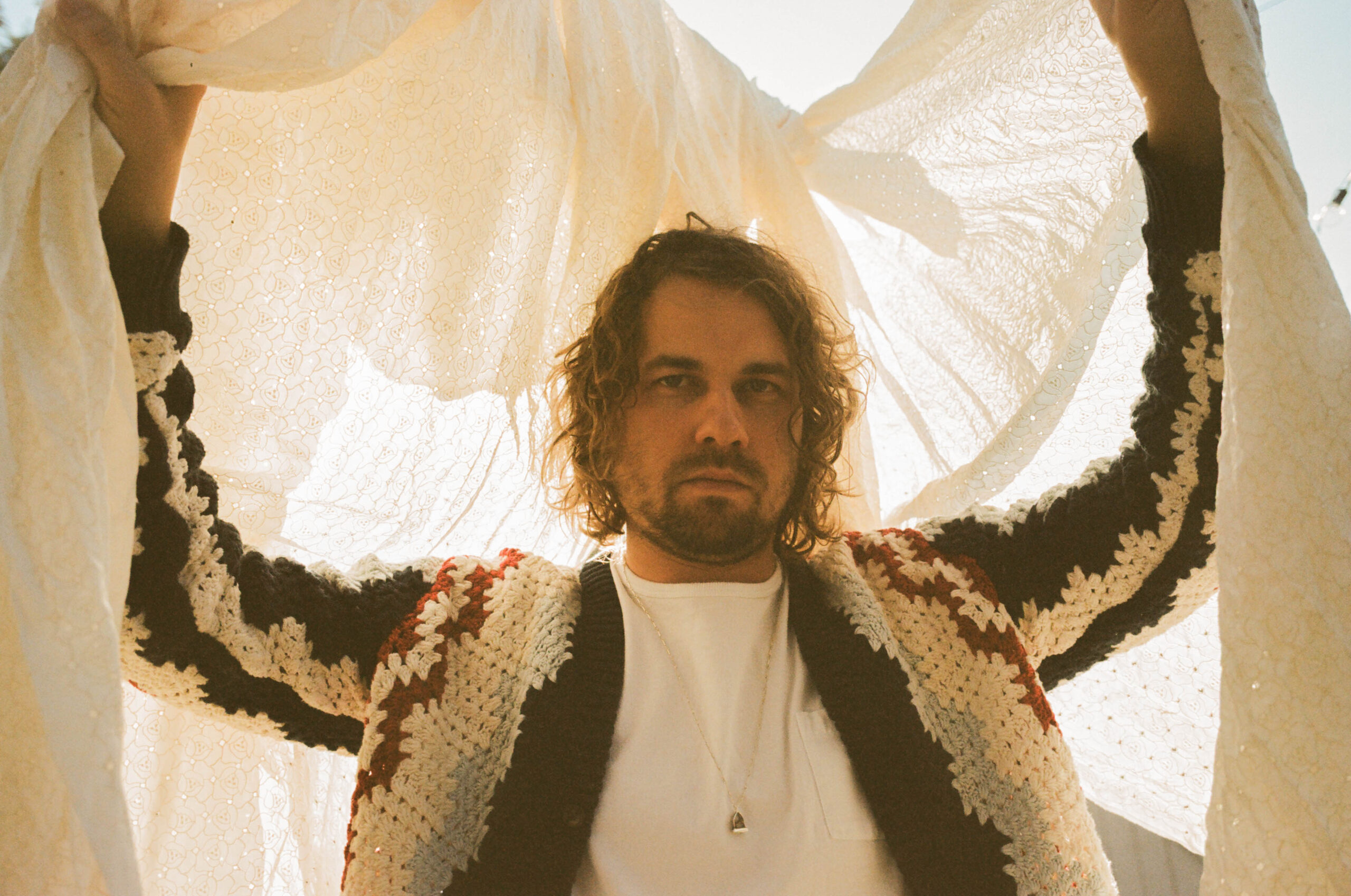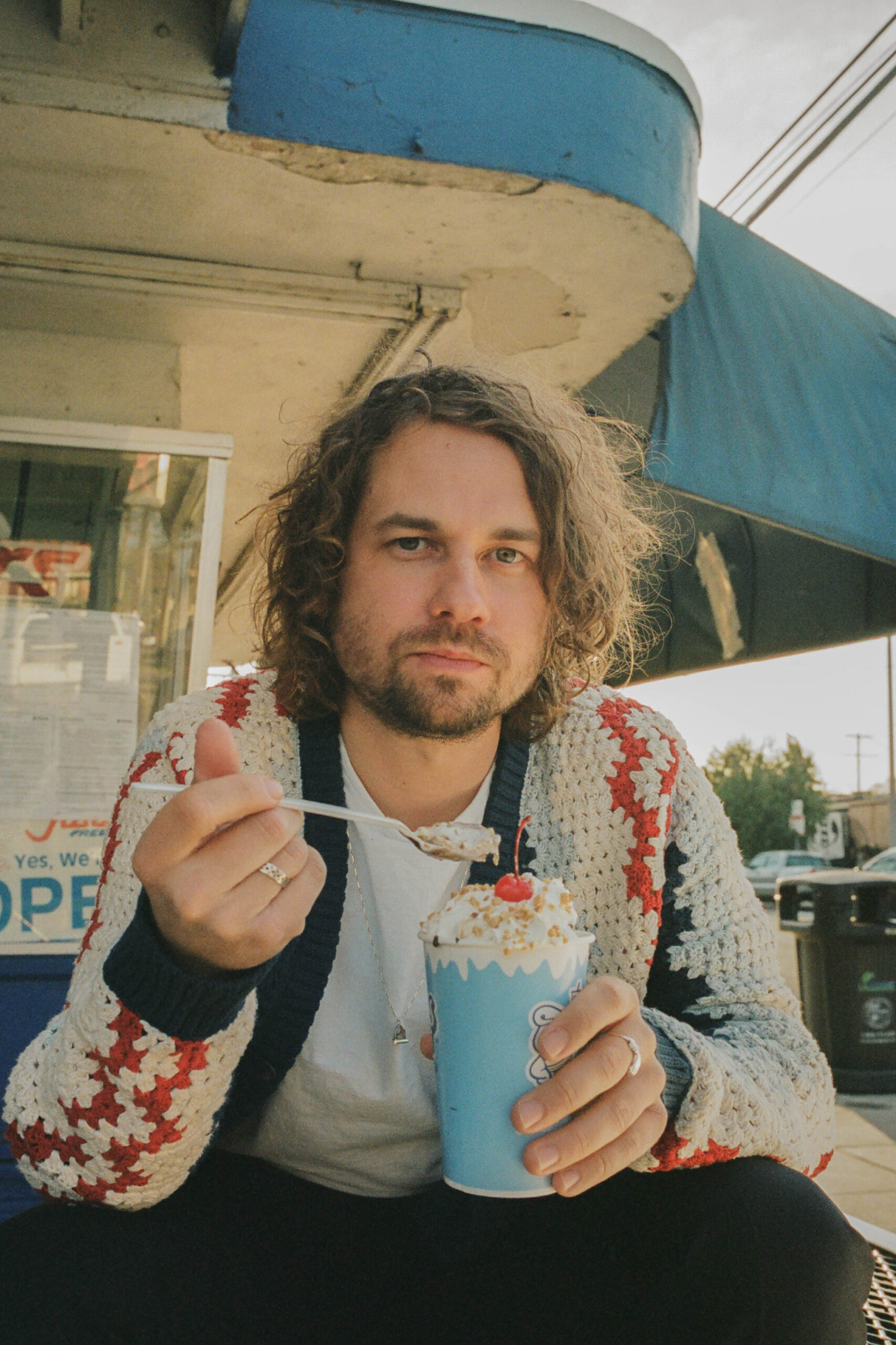Kevin Morby grew up in Overland Park, Kansas, a suburb roughly 20 minutes outside of downtown Kansas City. We’ve both lived here at different points in time, and as we chat in Union Station, a historic landmark in the heart of the city, we instantly make connections over high schools, street intersections, and formative memories.
The indie-folk singer-songwriter has used places as a leitmotif throughout his music, and his fascination with them is evident. Many of his records draw direct inspiration from them. His debut album, 2013’s Harlem River, explores his move to New York City; 2016’s Singing Saw tethers itself to Los Angeles, where Morby moved after New York; 2020’s Sundowner pays tribute to Morby’s home in Kansas City and his eventual return to it.
There’s something poetic about meeting Morby here, given his penchant for falling in love with different places and using them as a springboard into a new album. Though it’s now filled with attractions such as Science City, an escape room, and a coffee shop (where the two of us chat), it’s still a functioning train station. It opened in 1914, and, all these years later, people still use it to travel and see new places.
“No matter where I’m at or what I’m doing, I’m gonna be influenced by my surroundings in some way, shape, or form, whether good or bad,” Morby explains over an iced tea, long brown hair cascading down his face. “No matter where I’m at, I’m gonna be influenced by it. Even if I’m in a place and I hate it, it makes me think about another place. It’s gonna still inform what’s creatively speaking to me. In this case, Memphis spoke to me.”
For Morby’s seventh studio album, This Is a Photograph, he traveled to Memphis, a city with a rich musical history and the home of legends like Elvis Presley, Big Star, and Three 6 Mafia. He stayed in the lavish Peabody and spent time connecting with the city on a deeper level. He’d go to the Memphis Zoo and the Mississippi River to gather field recordings of birdsong and lapping water.
“I had read that Jeff Buckley had tried to get a job at the Memphis Zoo shortly before dying, which is very strange,” Morby says. “He was trying to be the butterfly keeper. He just really liked it there. I was spending time at the Memphis Zoo. It was an outdoor, nice thing to do. There’s a plaque for him there that Columbia Records donated when he died.”
More specifically, for “A Coat of Butterflies,” an homage to that singer, he went to the spot where Buckley waded into the waters and subsequently met his end. “I related to him on the level that he’s not from there,” Morby says. “He went there searching for something, and I really related to that. His story I found really relatable where he was trying to touch on something similar that I was, something very American and something very classic. His time there ended very tragically, and I just find it a very fascinating story.”

What Morby’s searching for on This Is a Photograph is multifaceted. There are themes of family, legacy, and, of course, place. Still, he emphasizes that this isn’t, in his own words, a “destination record,” a descriptor he uses to classify albums like City Music and Sundowner, given how the lyrics attach themselves to specific locales. Although Memphis plays a significant role in the record (for which he reunited with longtime collaborator Sam Cohen), Morby was ultimately exploring the present moment. He chronicles his experience in part by looking through old photographs of his family.
“The rest is left open to interpretation by whoever’s gonna find [the photos] in the future,” he says. “It is like a window into the past, but each photo is restoring the literal present moment. You can contextualize it and come at it from so many different angles, and it would tell a different story depending on when and where you look at it. It’s part of what I think is so fascinating about old family photos.”
On the title track, he sings about leafing through those photographs. He stumbles upon a photo of his “father on the front lawn with no shirt on” — an image that parallels what Morby had seen not long before writing that song. After a health scare, his father had fallen down, and Morby jumped out of his chair, held his father’s head with one hand, and snapped his fingers with the other in front of his father’s face. Moments later, his father’s eyes opened again, and EMTs eventually arrived and removed his shirt to check his vitals.
Not long after the incident, Morby went and looked through those old images. “But among the photos, there was one that I had never seen that stood out to me over all the rest: In it, my father, young and shirtless, seemed to almost taunt the camera with his over-confident gaze,” he writes in his recently created Substack.
[embedded content][embedded content]
Stumbling upon those old family photos was a catalyst for the new album, and it made Morby realize something.
“This Is a Photograph” will take on a different layer of meaning in a live setting. In the bridge, he repeatedly shouts, “This is what I’ll miss about being alive,” as the instrumentation gradually builds to a tumultuous swirl. For the recorded version, Morby is speaking from the perspective of his mother in a photograph. But there’s another interpretation there, and he was aware of that when he wrote the line.
“Because I love playing music more than anything,” he says, “it’s gonna be cathartic for me to be saying that and quite literally mean it.”

At the beginning of the record, there’s a snippet of Sam Cohen and Cohen’s daughter talking to each other, right before Morby launches into a song about his relationship with his own father. It’s a tender moment that divulges his goal as a musician: to not only document his own experiences, but also make space for others to ruminate on their own lives.
“My job in making music is to tell the story and paint it in such a way that people will understand it,” he explains. “It’s not just me telling them. It’s like someone making a movie about falling in love to show you what it felt like to them, creating a portal for them to know what that must feel like.”
While Morby’s writing has often focused on autobiography, this is a photograph with a frame wide enough for everyone’s stories.

Leave a comment